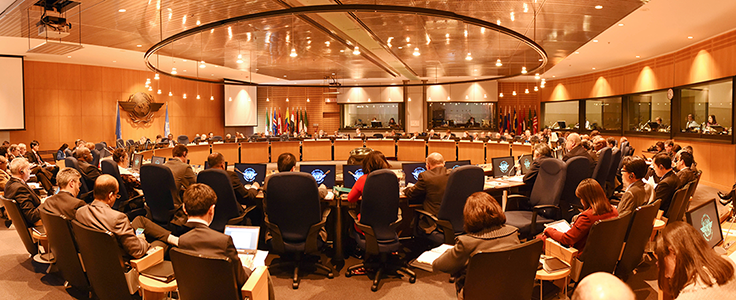
The 36-State ICAO Council. In endorsing the very first Global Aviation Security Plan today to improve international coordination, reponse, and planning relating to threats to civil aviation passengers, aircraft and facilities, the Council encouraged the ICAO Secretariat to continue refining and improving it on the basis of close continued cooperation with States and security stakeholders globally, and with due attention to all applicable implementation assistance and capacity building requirements in ICAO's Regions.
Montréal, 15 November 2017 – The ICAO Council took an historic step in endorsing the very first Global Aviation Security Plan to improve international coordination, response, and planning to counter threats to civil aviation passengers, cargo, aircraft and facilities.
“This new strategic document will assist ICAO Member States in their aviation security coordination with other States and applicable security agencies, as well as helping to nurture security cultures and capabilities, place greater focus on the role of new technologies and innovations, and refine related frameworks for oversight and quality assurance,” affirmed ICAO Council President Dr. Olumuyiwa Benard Aliu.
A set of indicators and target dates have also been established, and all associated targets and outcomes will be regularly reviewed and adjusted, taking into account all new and emerging aviation security threats.
“The Council has encouraged the ICAO Secretariat to continue refining and improving this critical living document, on the basis of close continued cooperation with States and security stakeholders globally, and with due attention to all applicable implementation assistance and capacity building requirements in ICAO's Regions,” Dr. Aliu further commented.
Subsequent to its first review of the new Global Aviation Security Plan in June 2017, the Council authorized its transmission to ICAO Member States and international organizations for comment. Ninety-six percent of those replies indicated agreement with its scope and purpose, as well as the related strategies and global targets, which will continue to be refined.
“The ICAO Secretariat has developed this strategic document on an accelerated basis to answer the call of ICAO's Council and Member States and the respective commitments and actions of national governments will now be essential to its overall impact and value,” commented ICAO Secretary General Dr. Fang Liu. “This new Global Aviation Security Plan will now take its place alongside ICAO's existing Global Plans for aviation safety and system-wide capacity and efficiency, and importantly it directly responds to various resolutions and expectations regarding aviation security and terrorism which have been expressed to ICAO by the United Nations Security Council.”
The ICAO Global Aviation Security Plan calls for action at the global, regional and national levels by States, industry and other stakeholders in raising the level of implementation of Annex 17 to the Convention on International Civil Aviation – Security.
Secretary General Liu further confirmed that a roadmap outlining 94 tasks, accompanying 32 actions under five key priority outcomes, will be central to the new Global Plan's roll out. These lay the groundwork for objectives over the next three years until the 40th Session of the ICAO Assembly in 2019.
In line with its contribution to the Global Counter-terrorism Strategy of the United Nations, ICAO will continue to coordinate with the Security Council and its various committees on all priorities relevant to aviation and border security, and bring together the private and public sector partners who help ensure our network remains at the dependable service of societies and economies.
https://www.icao.int/Newsroom/Pages/FR/ICAO-Council-endorses-new-Global-Aviation-Security-Plan.aspx

